DFG Projekt »Geist & Imagination«
Projektbeschreibung
Gemessen an der Rolle, die die Vorstellungskraft in unserer Lebenspraxis spielt, ist unser philosophisches Verständnis dieser Fähigkeit noch erstaunlich unterentwickelt. Das Projekt Geist und Imagination soll dabei helfen, diesen Missstand zu beheben, und dadurch zu einem vertieften und angemesseneren Verständnis unseres Geistes insgesamt beitragen.
Untersuchen möchten wir die Rolle sinnlicher Vorstellungen für zwei grundlegende Formen unserer geistigen Lebensvollzüge: unser Wahrnehmen und Handeln. In den beiden Teilprojekten möchten wir erstens anhand dieser zwei fundamentalen Bereiche des Geistigen exemplarisch prüfen und dann auch zeigen, dass und inwiefern die Vorstellungskraft weite Teile unseres geistigen Lebens prägt. Zweitens sollen durch den theoretischen Einsatz des Begriffs der Vorstellungskraft wichtige Probleme in der aktuellen wahrnehmungstheoretischen und handlungstheoretischen Debatte gelöst werden. Die Annahme zur Rolle der Vorstellungskraft soll sich demnach auch als theoretisch produktiv erweisen.
Mitarbeiter:innen
Dr. Christiana Werner (christiana.werner at phil.uni-giessen.de)
Wissenschaftliche Mitarbeiterin
Prof. Dr. Gerson Reuter (gerson.reuter at phil.uni-giessen.de)
Projektleiter Teilprojekt »Wahrnehmen und Vorstellungskraft«
Serena Gregorio (serena.gregorio at phil.uni-giessen.de)
Wissenschaftliche Mitarbeiterin, Dissertationsprojekt zum eudaimonischen Wert der Vorstellungskraft
Prof. Dr. Matthias Vogel (matthias.vogel at phil.uni-giessen.de)
Projektleiter Teilprojekt »Handeln und Vorstellungskraft«
Aktuelles
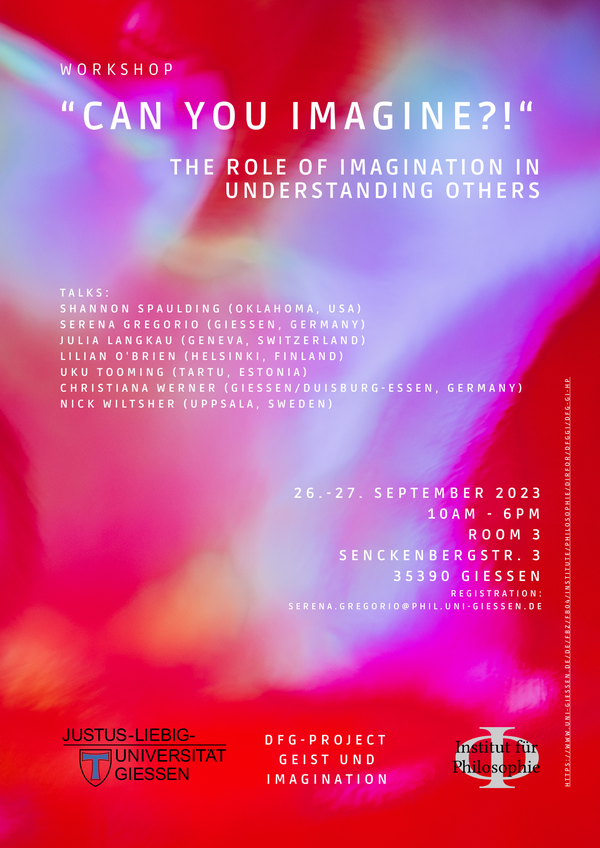
“I understand what you're going through”, “Do you feel misunderstood?”, “She gets me”—we are constantly entangled in attempts of understanding others and of making ourselves understood. But what does it mean, exactly, to understand another person? There are roughly two influential ways to answer this question: one refers to mental state recognition, and the second pertains to a folk psychological understanding of other people, particularly their linguistic and non-linguistic actions. In these contexts, one very often finds two core ideas: First, “understanding” is often conceived as explanatory understanding. For instance, theories of action, especially those within the Davidsonian tradition, provide answers to the question of how we understand other people’s action or behaviour by citing reasons for actions (typically a belief-desire pair). Second, “understanding” typically refers to propositional knowledge of another person’s mental state. Thus, to understand another person could mean to know her mental states and the inferential relations between these states. Both, propositional knowledge of another person’s mental states and explanatory understanding of her actions, are certainly important when it comes to understanding other persons. But is interpersonal understanding exhaustively explained by these two aspects?
Two hypotheses are at the centre stage of the workshop: the first one posits that there is a form of understanding that goes beyond mental state recognition and rationalisation by citing Humean reasons for actions. The second hypothesis is that, at least in some cases, imagination plays a decisive role in this understanding. In particular, the capacity to imaginatively take on another person’s perspective, including its phenomenal aspects, and to reenact her experiences may be crucial for the explanation of interpersonal understanding as well as its failure. But how can this manner of understanding be spelled out in a helpful way?
The workshop’s aim is to explore the role of imagination in interpersonal understanding, beyond the limits of rationalisation and mere social cognition
Conference Program
| 26.9.23 | 27.9.23 | |
| 10.00-11.30 |
Shannon Spaulding |
Uku Tooming |
| 11.30-11.45 | Break | Break |
| 11.45-13.15 |
Serena Gregorio |
Christiana Werner |
| 13.15-14.15 | Lunch break | Lunch break |
|
Julia Langkau |
Nick Wiltsher |
|
| 15.45-16.00 | Break | |
| 16.30-18.00 |
Lilian O'Brien |
The workshop, organised as part of the DFG-funded project “Geist und Imagination”, will take place (exclusively in presence) on the 26th and 27th of September 2023 at the Justus-Liebig-Universität in Gießen, Germany (Senckenbergstraße 3, 35390 Gießen; Room 3).
Start: 10.00 am (sine tempore)
Interested participants are invited to register by sending an email to serena.gregorio@phil.uni-giessen.de by September 15th.
Vergangene Veranstaltungen
Sommerseminar und öffentlicher Abendvortrag von Amy Kind (Claremont McKenna College): The Skill of Imagination (mehr Informationen hier).
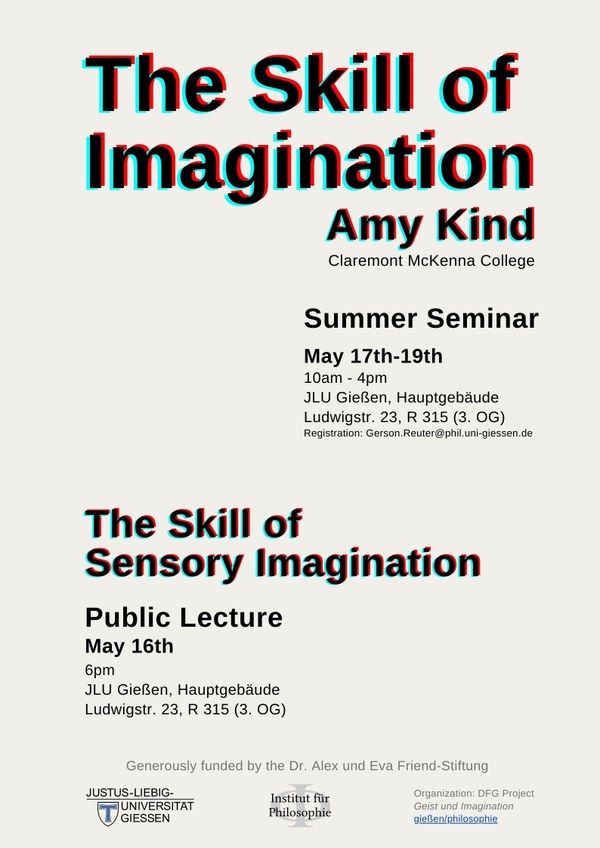
Workshop mit Amy Kind, Christian Badura und Julia Langkau | 20.05.2023
Vorlesungsreihe im Wintersemester 2021/22: »Vorstellungskraft: Historische Perspektiven«
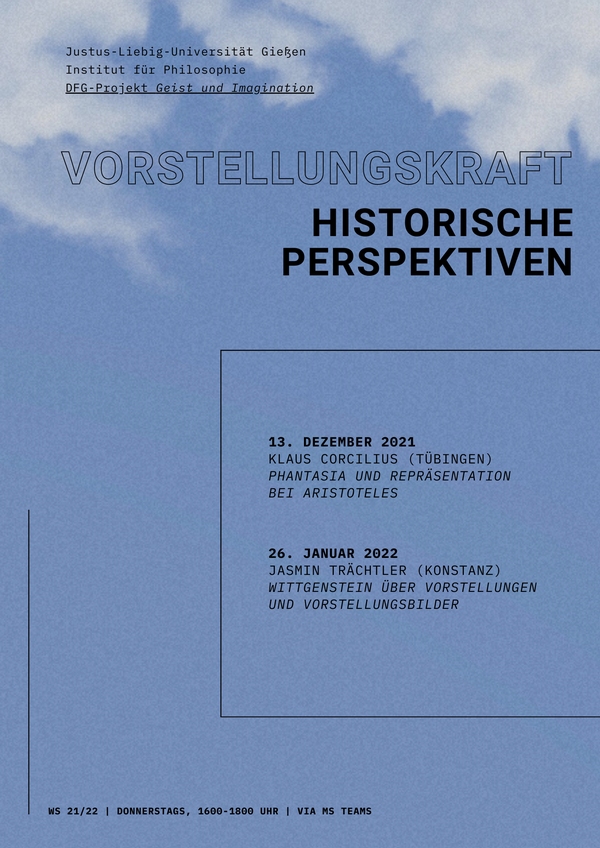
Klaus Corcilius (Tübingen): »Phantasia und Repräsentation bei Aristoteles« | 13.12.2021
Jasmin Trächtler (Dortmund): »Wittgenstein über Vorstellungen und Vorstellungsbilder« | 26.1.2022
Vorlesungsreihe Sommersemester 2021: »Imagination. Aktuelle Positionen«
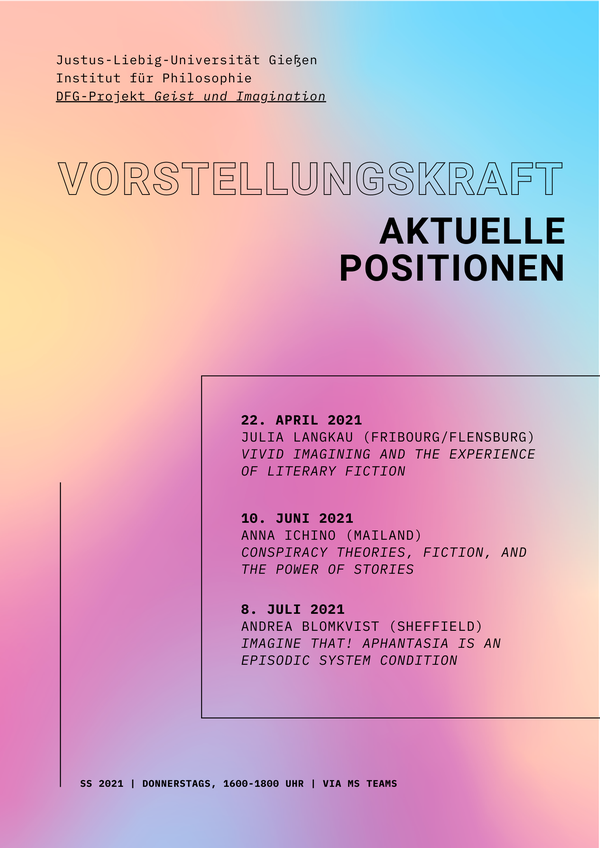
Julia Langkau (Fribourg): »Vivid Imagining and the Experience of Literary Fiction« | 22.4.2021
Anna Ichino (Mailand): »Conspiracy Theories, Fiction, and the Power of Stories« | 10.6.2021
Andrea Blomkvist (Sheffield): »Imagine That! Aphantasia is an Episodic System Condition« | 8.7.2021
WS 2020/21 Auftakt-Vorlesungsreihe »Getting the Mind to Work: Imagination«
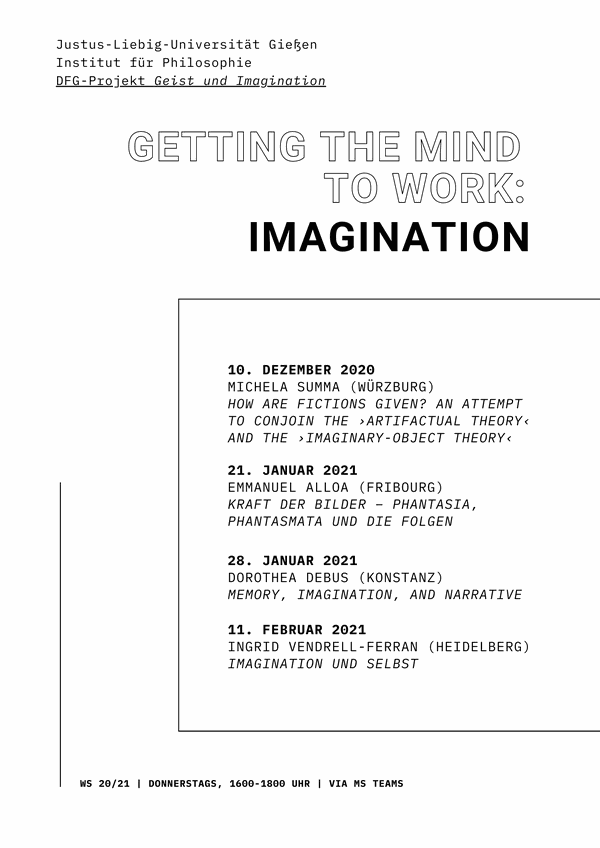
Michela Summa (Würzburg): »How are fictions given? An attempt to conjoin the ›Artifactual Theory‹ and the ›Imaginary-Object theory‹« | 10.12.2020
Emmanuel Alloa (Fribourg): »Kraft der Bilder – Phantasia, phantasmata und die Folgen« | 21.1.2021
Dorothea Debus (Konstanz): »Memory, Imagination, and Narrative« | 28.1.2021
Ingrid Vendrell-Ferran (Heidelberg): »Imagination und Selbst« | 11.2.2021

